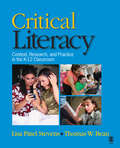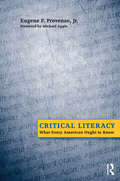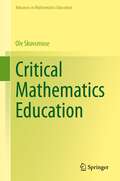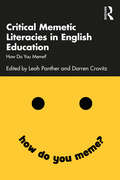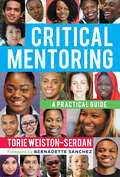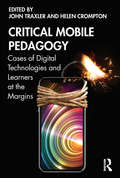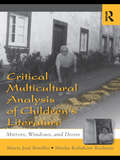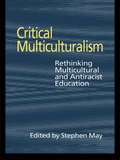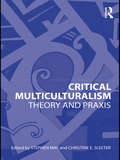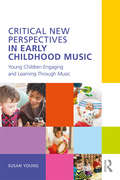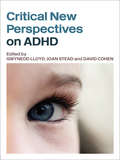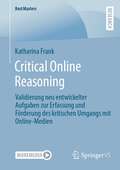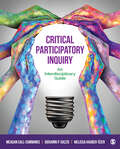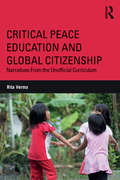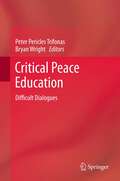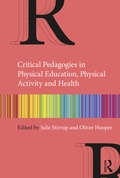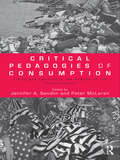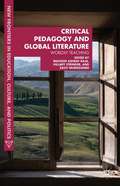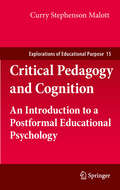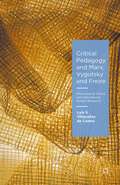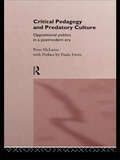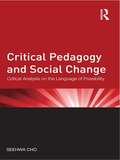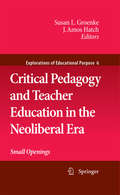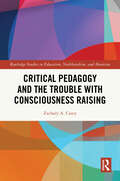- Table View
- List View
Critical Literacy: Context, Research, and Practice in the K-12 Classroom
by Thomas W. Bean Lisa Patel StevensAuthors Lisa Patel Stevens and Thomas W. Bean explore the historical and political foundations of critical literacy and present a comprehensive examination of its uses for K-12 classroom practice. <p><p> Key Features: <p> · Focuses on the nexus of critical literacy theory and practice through real classroom examples, vignettes, and conversations among teachers and teacher educators <p> · Illustrates how critical literacy practices are enacted in the classroom at the elementary, middle, and high school levels. <p> · Offers step-by-step teaching strategies for implementing critical literacy in K-12 classrooms at different paces, depending on existing curriculum <p> Intended Audience: This is an excellent supplemental text for a variety of advanced undergraduate and graduate courses in education departments on how to teach reading and writing. This text will also appeal to instructors and students exploring issues of representation, linguistics, and critical deconstruction.
Critical Literacy: What Every American Needs to Know (Series In Critical Narrative)
by Michael W. Apple Eugene F. ProvenzoIn Critical Literacy Eugene F. Provenzo Jr. challenges E. D. Hirsch's assumptions about culture and education. Calling for a broader and more democratic vision than Hirsch, Provenzo critiques Hirsch's legacy up through the current conservative educational agenda for education which, he argues, denies, not only the United States' diversity, but its democratic traditions of democratic participation. His book shows why critical faculties and skills of students are essential not only to the success of individual students but to their participation in a healthy democracy. Provenzo offers a list of 5,000 things every educated American ought to know-- none of them the same items as those included on Hirsch's list in Cultural Literacy. Critical Literacy is essential reading for those concerned with our schools and the future of our children.
Critical Mathematics Education (Advances in Mathematics Education)
by Ole SkovsmoseThe book Critical Mathematics Education provides Ole Skovsmose’s recent contribution to the further development of critical mathematics education. It gives examples of learning environments, which invite students to engage in investigative processes. It discusses how mathematics can be used for identifying cases of social injustice, and it shows how mathematics itself can become investigated critically. Critical Mathematics Education addresses issues with respect to racism, oppression, erosion of democracy, sustainability, formatting power of mathematics, and banality of mathematical expertise. It explores relationships between mathematics, ethics, crises, and critique.
Critical Memetic Literacies in English Education: How Do You Meme?
by Darren Crovitz Leah PantherThis edited collection introduces English and literacy educators to the theoretical, research-based, and practical dimensions of using digital memetic texts—“memes”—in the classroom. Digital memetic texts come with new affordances, particularly as avenues for student creativity, voice, and advocacy. But these texts can also be put to manipulative, propagandistic, and nefarious purposes, posing critical challenges to an informed, democratic citizenry. Grounded in multimodality and critical literacy, this book investigates the fascinating digital dimension of texts, audiences, and meaning, and considers how English educators might take up these conversations in practical ways with students. With authentic examples from teachers and students, this volume provides a road map to researchers and educators—both preservice and in-service—interested in critical and productive uses of these modern phenomena.
Critical Mentoring: A Practical Guide
by Torie Weiston-SerdanThis book introduces the concept of critical mentoring, presenting its theoretical and empirical foundations, and providing telling examples of what it looks like in practice, and what it can achieve. At this juncture when the demographics of our schools and colleges are rapidly changing, critical mentoring provides mentors with a new and essential transformational practice that challenges deficit-based notions of protégés, questions their forced adaptation to dominant ideology, counters the marginalization and minoritization of young people of color, and endows them with voice, power and choice to achieve in society while validating their culture and values.Critical mentoring places youth at the center of the process, challenging norms of adult and institutional authority and notions of saviorism to create collaborative partnerships with youth and communities that recognize there are multiple sources of expertise and knowledge. Torie Weiston-Serdan outlines the underlying foundations of critical race theory, cultural competence and intersectionality, describes how collaborative mentoring works in practice in terms of dispositions and structures, and addresses the implications of rethinking about the purposes and delivery of mentoring services, both for mentors themselves and the organizations for which they work. Each chapter ends with a set of salient questions to ask and key actions to take. These are meant to move the reader from thought to action and provide a basis for discussion.This book offers strategies that are immediately applicable and will create a process that is participatory, emancipatory and transformative.
Critical Mobile Pedagogy: Cases of Digital Technologies and Learners at the Margins
by John Traxler and Helen CromptonCritical Mobile Pedagogy is an exploration of mobile technologies for designing and delivering equitable and empowering education around the globe. Synthesizing a diverse range of projects and conceptual frameworks, this case-based collection addresses the ambitions, assumptions, and impacts of interventions in under-researched, often disadvantaged communities. The editors and authors provide a nuanced and culturally responsive approach to showcasing: indigenous, nomadic, refugee, rural, and other marginalized communities emerging pedagogies such as curation, open resources, massive open online courses (MOOCs), and self-directed learning contextual factors, including pedagogy, ethics, scaling, research methodology and culture, and consequences of innocuous or harmful implementation and deployment the nature of participation by global capital, multinationals, education systems, international agencies, national governments, and telecoms companies. Scholars, academics, policymakers, and program managers are increasingly using mobile technologies to support disadvantaged or disempowered communities in learning more effectively and appropriately. This book’s diverse research precedents will help these and other stakeholders meet the challenges and opportunities of our complex, increasingly connected world and work with greater cultural and ethical sensitivity at the intersection of education, research, and technology.
Critical Multicultural Analysis of Children's Literature: Mirrors, Windows, and Doors (Language, Culture, and Teaching)
by Maria José Botelho Masha Kabakow Rudman<p>Critical multicultural analysis provides a philosophical shift for teaching literature, constructing curriculum, and taking up issues of diversity and social justice. It problematizes children’s literature, offers a way of reading power, explores the complex web of sociopolitical relations, and deconstructs taken-for-granted assumptions about language, meaning, reading, and literature: it is literary study as sociopolitical change. <p>Bringing a critical lens to the study of multiculturalism in children’s literature, this book prepares teachers, teacher educators, and researchers of children’s literature to analyze the ideological dimensions of reading and studying literature. Each chapter includes recommendations for classroom application, classroom research, and further reading. Helpful end-of-book appendixes include a list of children’s book awards, lists of publishers, diagrams of the power continuum and the theoretical framework of critical multicultural analysis, and lists of selected children’s literature journals and online resources.</p>
Critical Multiculturalism: Rethinking Multicultural and Antiracist Education (Social Research And Educational Studies)
by Stephen MayThis book aims to bring together two movements - multiculturalism and anti- racism - which, though having aims in common, have been at arms length in the past. Differences of emphasis have meant that classroom practice has been the natural realm of multiculturalism, while anti-racism has been dissatisfied with an approach that accentuates life-style at the expense of challenging or changing the racism that minority students experience. In these debates, there has been a concentration on culturally specific topics and this book goes beyond national boundaries to find how international concerns and contexts might provide answers to problems faced in single countries. Leading figures in the USA, Canada, South Africa, the UK and Australasia write on the issues.
Critical Multiculturalism: Theory and Praxis
by Stephen MayCritical multiculturalism has emerged over the last decade as a direct challenge to liberal or benevolent forms of multicultural education. By integrating and advancing various critical theoretical threads such as anti-racist education, critical race theory, and critical pedagogy, critical multiculturalism has offered a fuller analysis of oppression and institutionalization of unequal power relations in education. But what do these powerful theories really mean for classroom practice and specific disciplines? Edited by two leading authorities on multicultural education, Critical Multiculturalism: Theory and Praxis brings together international scholars of critical multiculturalism to directly and illustratively address what a transformed critical multicultural approach to education might mean for teacher education and classroom practice. Providing both contextual background and curriculum specific subject coverage ranging from language arts and mathematics to science and technology, each chapter shows how critical multiculturalism relates to praxis. As a watershed in the further development of critical multicultural approaches to education, this timely collection will be required reading for all scholars, educators and practitioners of multicultural education.
Critical New Perspectives in Early Childhood Music: Young Children Engaging and Learning Through Music
by Susan YoungExploring and expanding upon current understandings of early childhood music education, this book provides a much-needed response to the rapid social, cultural and technological developments affecting children’s experience of music today. Critical New Perspectives in Early Childhood Music returns to the core question of how children engage, participate and learn through music, and how we are to best harness musical resources to their benefit. Chapters move beyond conservative or traditional models of practice and draw upon new and emerging insights from the fields of childhood studies, neuroscience, psychology and sociology. In-depth analysis of research and real examples from practice illustrate the strengths and possible shortcomings of each approach and acknowledge the diverse impacts of digitisation, increased child autonomy, intensive parenting practices, and cultural and economic diversity on the child’s experience of music. An invaluable theoretical overview of current thinking in relation to contemporary musical childhoods, this book will support and challenge students and early childhood music educators as they rethink practice for the present day.
Critical New Perspectives on ADHD
by Gwynedd LloydExperts from all over the world take a critical, highly international and often controversial perspective on the ADHD phenomenon – a condition that has reached global proportions, significantly affecting the lives of children, parents and teachers worldwide. This book raises a number of concerns often not covered by the material currently available to parents and practitioners. Critical New Perspectives on ADHD unpicks the myths surrounding the development of this phenomenon and leaves no stone unturned in its search for answers. An in-depth exploration into the reasons for the emergence and maintenance of ADHD lead to suggested explanations of the dominance of US psychiatric models and the need for new markets for major pharmaceutical companies, as well as the functions that ADHD diagnoses fulfil in families, classrooms and communities. In a world where moves to educational inclusion are paradoxically paralleled by the ever-increasing use of medication to control children’s behaviour, this book scrutinises current accepted practice and offers alternative perspectives and strategies for teachers and other education professionals. This in an invaluable resource for anyone with a serious interest in ADHD and other behavioural difficulties.
Critical Online Reasoning: Validierung neu entwickelter Aufgaben zur Erfassung und Förderung des kritischen Umgangs mit Online-Medien (BestMasters)
by Katharina FrankDas Lernen mit frei zugänglichen Online-Ressourcen als wichtige Informationsquelle zum Erwerb neuen Wissens birgt einige Herausforderungen, da Inhalte im Internet frei verbreitet werden können und unüberschaubare Mengen an unstrukturierten, unzuverlässigen, oder voreingenommenen Informationen leicht zugänglich sind. Studierende müssen in der Lage sein, Online-Informationen und -Quellen zu suchen, zu selektieren, auszuwählen, zu überprüfen und anhand relevanter Kriterien kritisch zu bewerten. In Deutschland wurde dahingehend ein neuer theoretisch-konzeptueller Ansatz für die Operationalisierung dieser Fähigkeiten durch das Konstrukt Critical Online Reasoning (COR) sowie Messung dieser Fähigkeiten mittels eines neuen Assessments (CORA) entwickelt. Auf Grundlage theoretischer Überlegungen zum COR-Konstrukt sowie zur argumentationsbasierten Validierung nach den Standards for Educational and Psychological Testing (AERA et al.) ist das Ziel dieser Arbeit eine Analyse von zentralen Validierungsaspekten.
Critical Participatory Inquiry: An Interdisciplinary Guide
by Meagan Call-Cummings Giovanni P. Dazzo Melissa Hauber-OzerCritical Participatory Inquiry: An Interdisciplinary Guide brings to life key principles of this collaborative research method for students, practitioners, and research collectives. The authors encourage readers to uncover new possibilities in research guided by the emancipatory roots of CPI to deconstruct inequitable conditions and practices. Weaving together theoretical perspectives, a variety of tools for data collection and analysis, and numerous practical examples, the authors offer a complete picture of the research process from start to finish. This thoughtful and thorough book prepares readers to co-create knowledge effectively and ethically. By addressing the underlying principles common to a variety of action and participatory research methods, readers learn to design and carry out research with, not on, communities. With examples from public health, social work, psychology, education, criminal justice, conflict resolution, and more, the text is suited to a wide variety of graduate-level courses and better reflects the interdisciplinary nature of participatory research with collectives of all sizes and compositions.
Critical Participatory Inquiry: An Interdisciplinary Guide
by Meagan Call-Cummings Giovanni P. Dazzo Melissa Hauber-OzerCritical Participatory Inquiry: An Interdisciplinary Guide brings to life key principles of this collaborative research method for students, practitioners, and research collectives. The authors encourage readers to uncover new possibilities in research guided by the emancipatory roots of CPI to deconstruct inequitable conditions and practices. Weaving together theoretical perspectives, a variety of tools for data collection and analysis, and numerous practical examples, the authors offer a complete picture of the research process from start to finish. This thoughtful and thorough book prepares readers to co-create knowledge effectively and ethically. By addressing the underlying principles common to a variety of action and participatory research methods, readers learn to design and carry out research with, not on, communities. With examples from public health, social work, psychology, education, criminal justice, conflict resolution, and more, the text is suited to a wide variety of graduate-level courses and better reflects the interdisciplinary nature of participatory research with collectives of all sizes and compositions.
Critical Peace Education and Global Citizenship: Narratives From the Unofficial Curriculum (Critical Social Thought)
by Rita VermaCritical Peace Education and Global Citizenship offers narrative accounts representing multiple ways teacher and learner activists have come to realize possibilities for peace and reconciliation through unofficial curricula. With these narratives, the book demonstrates the connections between critical peace education and such crucial issues as human trafficking, gang violence, contested narratives of nationhood and belonging, gender identities, and the significance of mentoring. Through rich examples of pedagogic work, this volume enhances and illustrates critically oriented understandings and interpretations of peace in real classrooms with diverse populations of students. Written primarily for scholars and graduate students working in the fields of educational theory, critical pedagogy, and educational policy, the chapters in this book tell a compelling story about teachers, learners and scholar activists who continue to struggle for the creation of transformative and meaningful sites for peace praxis.
Critical Peace Education: Difficult Dialogues (Routledge Research In Education)
by Bryan Wright Peter Pericles TrifonasForward-thinking pedagogues as well as peace researchers have, in recent decades, cast a critical eye over teaching content and methodology with the aim of promulgating notions of peace and sustainability in education. This volume gives voice to the reflections of educational theorists and practitioners who have taken on the task of articulating a 'curriculum of difference' that gives positive voice to these key concepts in the pedagogical arena. Here, contributors from around the world engage with paradigm-shifting discourses that reexamine questions of ontology and human subjectivity--discourses that advocate interdisciplinarity as well as the reformulation of epistemological boundaries. Deconstructing the origins and limits of human knowledge and learning, the book affords educators the opportunity to identify and express common elements of the subjects taught and studied in educational institutions, elements that facilitate students' apprehension of peace and sustainability. With penetrating analysis of contemporary issues in the field, this volume introduces a range of fresh theoretical approaches that extend the boundaries of peace education, which is broadly defined as promoting the responsible, equitable and sustainable co-existence of differing human communities. In doing so, the chapters show how we can improve our lives as well as our chances of survival as a species by acknowledging the importance of shared human aspirations that cut across borders, of genuinely listening to alternative voices and opinions, of challenging the ubiquitous, socially constructed historical narratives that define human relations only in terms of power. Charged with vitality and originality, this new publication is a critical examination of issues central to the development and utility of global education.
Critical Pedagogies in Physical Education, Physical Activity and Health
by Julie Stirrup Oliver HooperCritical Pedagogies in Physical Education, Physical Activity and Health explores critical pedagogy – and critical work around the body, health and physical activity – within physical education. By examining the complex relationships between policies and practice, and how these are experienced by young people, it elucidates the need for critical pedagogy in contemporary times. With contributions from leading international experts in health and physical education, and underpinned by a critical, socio-cultural approach, the book examines how health and physical education are situated across various international contexts and the influence of policy and curriculum. It explores how health is constructed by students and teachers within these contexts as well as how wider spaces and places beyond formal schooling influence learning around the body, health and physical activity. Finally, it considers what progressive pedagogies might ‘look like’ within health and physical education. Chapters utilise empirical work within the field to explore various topics of relevance to critical pedagogy, drawing on theoretical insights while providing practical applications and concluding with reflection points to encourage readers to consider the relevance for their own contexts. Designed to support pedagogical study in a range of contexts, this book will be of particular interest to undergraduate and postgraduate students, teachers and researchers with an interest in physical education, physical activity and health and the role they play in young people’s lives.
Critical Pedagogies of Consumption: Living and Learning in the Shadow of the "Shopocalypse" (Sociocultural, Political, and Historical Studies in Education)
by Jennifer A. Sandlin Peter McLaren"Utopian in theme and implication, this book shows how the practices of critical, interpretive inquiry can help change the world in positive ways…. This is the promise, the hope, and the agenda that is offered."--Norman K. Denzin, From the Foreword "Its focus on learning, education and pedagogy gives this book a particular relevance and significance in contemporary cultural studies. Its impressive authors, thoughtful structuring, wide range of perspectives, attention to matters of educational policy and practice, and suggestions for transformative pedagogy all provide for a compelling and significant volume."--H. Svi Shapiro, University of North Carolina–Greensboro Distinguished international scholars from a wide range of disciplines (including curriculum studies, foundations of education, adult education, higher education, and consumer education) come together in this book to explore consumption and its relation to learning, identity development, and education. Readers will learn about a variety of ways in which learning and education intersect with consumption. This volume is unique within the literature of education in its examination of educational sites – both formal and informal – where learners and teachers are resisting consumerism and enacting a critical pedagogy of consumption.
Critical Pedagogy And Global Literature
by Masood Ashraf Raja Hillary Stringer Zach VandezandeIn one volume, this edited collection provides both a theoretical and praxis-driven engagement with teaching world literature, focusing on various aspects of critical pedagogy. Included are nine praxis-driven essays by instructors who have taught world literature courses at the university level.
Critical Pedagogy and Cognition: An Introduction to a Postformal Educational Psychology (Explorations of Educational Purpose #15)
by Curry Stephenson MalottThis book simultaneously contributes to the fields of critical pedagogy and educational psychology in new and innovative ways by demonstrating how critical pedagogy, postformal psychology, and Enlightenment science, seemingly separate and distinct disciplines, are actually part of the same larger, contextualized, complex whole from the inner most developmentally-fixed biological context of human faculties to the perpetually shifting, socially and politically constructed context of individual schema and human civilization. The text's uniqueness stems from its bold attempt to connect the postformal critical constructivist/pedagogy work of Joe Kincheloe and others to Western science through a shared, although previously misunderstood, critique and rejection of crude forms of social control, which the psychologists call behaviorism and Western scientists identify as mechanical philosophy. This book therefore argues that critical pedagogy-- which includes, among others, anarchist, Marxist, feminist, Indigenous (globally conceived), Afro-Caribbean/American, and postmodern traditions--and critical/constructivist educational psychology have much to gain by engaging previously rejected work in critical solidarity, that is, without compromising one's values or democratic commitments. The goal of this book is therefore to contribute to this vision of developing a more transgressive and transformational educational psychology.
Critical Pedagogy and Marx, Vygotsky and Freire: Phenomenal Forms and Educational Action Research
by Luis S. Villacañas de CastroThis book explores Marx's theory of the phenomenal forms in relation to critical pedagogy and educational action research, arguing that phenomenal forms pose a pedagogical obstacle to any endeavour that seeks to expand an individual's awareness of the larger social whole.
Critical Pedagogy and Predatory Culture: Oppositional Politics in a Postmodern Era
by Peter McLarenThis book is a principled, accessible and highly stimulating discussion of a politics of resistance for today. Ranging widely over issues of identity, representation, culture and schooling, it will be required reading for students of radical pedagogy, sociology and political science.
Critical Pedagogy and Social Change: Critical Analysis on the Language of Possibility (Critical Social Thought)
by Seehwa ChoAt its core, the main goal of critical pedagogy is deceptively simple—to construct schools and education as agents of change. While noble and ambitious, it is not always realistic in a climate of increased commodification, privatization of schooling, and canned curriculum. By assuming rather than articulating its own possibilities, critical pedagogy literature itself is often its own worst enemy in its call for transformation. With such challenges from both within and without, is the idea of liberatory pedagogy for social change out of reach or can critical educators really achieve the rather high call for social change? What alternative visions of schooling does critical pedagogy truly offer against the mainstream pedagogy? In short, what are the political projects of critical pedagogy? This powerful and accessible text breaks with tradition by teasing out mere assumptions, and provides a concrete illustration and critique of today’s critical pedagogy. Veteran teacher educator Seehwa Cho begins the book with an engaging overview of the history of critical pedagogy and a clear, concise breakdown of key concepts and terms. Not content to hide behind rhetoric, Cho forces herself and the reader to question the most basic assumptions of critical pedagogy, such as what a vision of social change really means. After a thoughtful and pithy analysis of the politics, possibilities and agendas of mainstream critical pedagogy, Cho takes the provocative step of arguing that these dominant discourses are ultimately what stifle the possibility for true social change. Without focusing on micro-level approaches to alternatives, Cho concludes by laying out some basic principles and future directions for critical pedagogy. Both accessible and provocative, Critical Pedagogy and Social Change is a significant contribution to the debates over critical pedagogy and a fresh, much-needed examination of teaching and learning for social justice in the classroom and community beyond.
Critical Pedagogy and Teacher Education in the Neoliberal Era: Small Openings (Explorations of Educational Purpose #6)
by J. Amos Hatch Susan L. GroenkeThe chapters in this edited collection make it clear that critical teacher educators are aware of neoliberalism and its profound impact on public schools and university-based teacher preparation programs. They know the deleterious effects of macro-level, neoliberal forces on the local and particular teaching contexts where they are trying to do critical pedagogical work. The authors describe the havoc NCLB has wreaked, especially on minority and ELL students; the pressures university-based teacher preparation programs feel to align themselves with neoliberal agendas; and the frustration of knowing that critical work is not always valued, supported, or understood in academe. Yet all of the authors in this book persist, finding or creating "small openings" in their contexts that foster the critical reflection, intellectual engagement, and examination of alternative paradigms that help beginning teachers pursue deeper understandings about schooling in a democratic society. They describe these openings here.
Critical Pedagogy and the Trouble with Consciousness Raising (Routledge Studies in Education, Neoliberalism, and Marxism)
by Zachary A. CaseyCritical Pedagogy and the Trouble with Consciousness Raising incisively critiques the consciousness-raising project that has been so central to contemporary critical pedagogy.The book argues that consciousness-raising work in formal educational settings over the past three decades has largely failed to advance social justice. By critiquing consciousness raising as an end in itself, the author employs a Marxist framework to highlight how consciousness raising alone cannot alter material conditions and realities. Consequently, the book illustrates how many pedagogical projects fail to transcend the idealist realm and impact the material world. Advocating for a materialist critical pedagogy that revisits Freirean principles of praxis and dialogue, the author proceeds to outline a politics of redistribution to invigorate future critical educational projects. From examining how discourse functions ideologically to uphold the status quo, to exploring how determinisms limit our life chances and imaginations, the author demonstrates that the challenges in achieving socially just education are largely self-imposed. The book concludes with a new approach to critical pedagogy that avoids reifying consciousness raising and reasserts the importance of praxis in all critical educational endeavors. It will appeal to scholars and researchers interested in critical pedagogy, the sociology of education, critical theory, and the philosophy of education.
